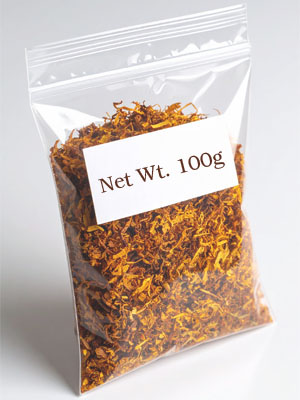Discount Tobacco Delivered to Your Home
100g Organic Tobacco with no chemical additives
I always wondered why Big Brother wants to ban tobacco products containing nicotine in the name of public health, when the COVID Scamdemic demonstrated that they couldn't care less about your health.
 Nicotine, which is almost universally vilified as the villain behind smoking-related diseases, might hold untapped therapeutic potential. Imagine this: an alkaloid long condemned by the main-stream medical community, could alleviate symptoms of Parkinson's, enhance cognitive function, or even regulate inflammatory diseases.
Nicotine, which is almost universally vilified as the villain behind smoking-related diseases, might hold untapped therapeutic potential. Imagine this: an alkaloid long condemned by the main-stream medical community, could alleviate symptoms of Parkinson's, enhance cognitive function, or even regulate inflammatory diseases.
Nicotine's role as a cognitive enhancer is a revelation that challenges its entrenched association with harm. Research into nicotinic acetylcholine receptors (nAChRs) reveals their critical function in modulating attention, memory, and neuroplasticity. These receptors, when activated by nicotine, stimulate the release of neurotransmitters like dopamine and acetylcholine, creating a cascade of neural benefits. Studies have shown that microdoses of nicotine can improve working memory and focus in individuals with cognitive impairments, offering a potential breakthrough for conditions like Alzheimer's or ADHD.
Nicotine operates as a molecular locksmith, unlocking nicotinic acetylcholine receptors (nAChRs) to modulate neural activity. These receptors, abundant in the brain, act as gatekeepers for neurotransmitter release. When nicotine binds, it triggers a cascade: dopamine for reward, glutamate for learning, and acetylcholine for focus. Think of it as flipping switches in a neural control room, fine-tuning cognitive and emotional responses.
Unexpectedly, nicotine's effects vary by receptor subtype. For instance, a7 nAChRs enhance memory by boosting synaptic plasticity, while a4β2 receptors regulate mood and vigilance.
Case studies in Alzheimer's research reveal nicotine's ability to reduce amyloid plaque, hinting at neuroprotective potential. Yet, misconceptions persist, conflating nicotine with tobacco's harms. By embracing its receptor-targeting precision, we can reimagine nicotine as a tool for cognitive restoration, bridging neuroscience and therapeutic innovation.
Interaction with the Nervous System
Nicotine's interaction with the nervous system is a masterclass in precision engineering. By binding to nAChRs, it doesn't just activate neurons - it orchestrates a symphony of neural communication. A standout example is its effect on the prefrontal cortex, the brain's executive hub. Here, nicotine enhances synaptic efficiency, improving attention and decision-making. This is why microdoses are being explored as treatments for ADHD, offering a targeted alternative to traditional stimulants.
What's fascinating is nicotine's dual role: it excites neurons while simultaneously desensitizing receptors, creating a self-regulating feedback loop. This mechanism has implications for mood disorders, where overstimulation of neural circuits often leads to burnout. Emerging research even links nicotine to neurogenesis, suggesting it may help repair damaged pathways in conditions like Parkinson's.
The takeaway? Nicotine's nuanced interaction with the nervous system challenges its vilified reputation, opening doors to therapies that blend neuroscience with precision medicine. The future lies in harnessing this complexity.
Nicotine and Cholinergic Pathways
Nicotine's influence on cholinergic pathways reveals a fascinating interplay between neurotransmitter dynamics and cognitive function. By targeting nAChRs, nicotine amplifies acetylcholine release, a neurotransmitter critical for learning, memory, and sensory processing. This mechanism is particularly potent in the hippocampus, where enhanced cholinergic signaling strengthens synaptic plasticity, a cornerstone of long-term memory formation.
What's less discussed is nicotine's role in modulating the balance between excitatory and inhibitory signals. For instance, it fine-tunes GABAergic activity, preventing overstimulation in neural circuits – a potential game-changer for treating epilepsy or anxiety disorders. Additionally, its impact on cholinergic anti-inflammatory pathways suggests applications in neuroinflammation, linking nicotine to emerging treatments for multiple sclerosis and other autoimmune conditions.
The real-world implications are profound: nicotine could serve as a bridge between neurology and immunology, challenging its stigma. Future therapies might leverage its precision to recalibrate disrupted cholinergic systems, unlocking new frontiers in personalized medicine.